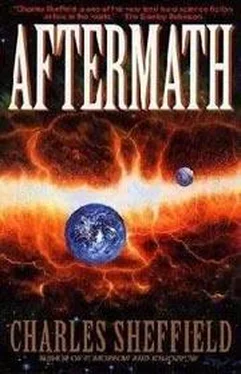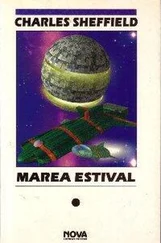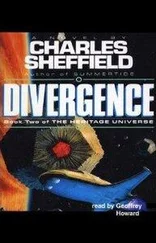“I think it moved a bit.” Seth was peering up from the foot of the ladder. “Come down, and let’s try something different.”
He took the wrench from Art, climbed the ladder, and halted on the second rung.
“The two of you hold me at the legs and waist. This needs a two-handed swing.”
Dana gripped Seth’s waist. Art reached higher, to support his lower back.
“Hold tight and try to catch me if I fall off. I’m not gonna hold anythin’ back.” Seth, turning sideways, gave an explosive grunt and rammed the wrench against the bottom of the grating.
“Any good?” Art again had a face full of snow.
“Nah. Nothing. Move, you mother, move .” The wrench thrust out, again and again, while Seth grunted and cursed. At the fifth effort he moved higher on the ladder and said, “Watch out below. I’m dropping the wrench.”
Art and Dana stepped quickly out of the way. A moment later came Seth’s gasp of triumph. “Yeah, baby. Here we go.”
He was pushing the grating, turning it upward on its hinges and climbing higher on the ladder. Finally he could scramble out through the square opening. He peered down at them.
“Come join me. Let’s see if we know where we are and where we go from here.”
Holding the heavy wrench in one hand, Art climbed awkwardly after Dana. Outside, he peered at the world through half-closed eyes. Daylight was blindingly bright after the gloom of the storm drains. He did not know how long they had been underground, but judging from the position of the sun in the cloudy sky it was early afternoon. The snow had tailed away to nothing.
Art surveyed the cold, still, and silent landscape. He stood at the foot of a bank covered with shrubs and small trees. Directly in front, in what he judged was roughly south, he saw a gleam of dull gray. Beyond that lay taller trees and, farther off, another and larger body of water.
“Well?” Dana said. She and Seth were staring expectantly at Art. “This is your stamping ground, not ours. What do you make of it, stout Cortez? Where are we?”
Art was pulling out a map with fingers that still trembled from the effort to open the storm drain cover.
“I’m pretty sure we are right here.” He unfolded the map and placed his finger at a point on the bottom left quadrant. “Near a place called Cabin John. The water you see right in front of us is the C O Canal — the Chesapeake and Ohio. We’re at a spillway into it. You can’t see the towpath on the other side because of the snow, but it runs all the way down into Georgetown. We couldn’t use the canal, though, even if we had a boat, because it has locks all the way down, and you can’t operate them without power. Beyond the evergreens is the Potomac River. Downstream is to the left. There are rapids, but the bad ones are upriver toward Great Falls.”
“Boats?” Seth asked.
“I don’t know if we’ll find any close to here. There’s a big boathouse downstream, on this side of the river. But it’s about three miles away. And they rent boats that you row, not boats with motors.”
“Renting ain’t what we got in mind today. We’ll borrow. But, boy, you weren’t kidding. You really know this area.”
“I guess I do.” As Art replied he was taken by a memory, thirty and more years old, of a warm afternoon when he and Mary had walked the towpath together, gathering wild hollyhocks and sweet-smelling phlox from close to the water’s edge. Two small boys were ahead of them, uncomfortably close to the quiet canal. Mary, worried not at all about Art teetering on the steep bank and in need of a steadying hand, had rushed off after the children. The summer memory was so piercing and so bittersweet that his eyes rejected today’s snow and its leaden reflection in the canal.
“Art?” Dana tugged at his sleeve. More sensitive than Seth, she had caught something new in his expression. “Do you need to rest?”
“No.” Art took a deep breath. No summer flowery perfume now, but the clean, cool smell of pine. “I’m doing all right. Where do we go from here?”
“We need a boat,” Seth said. “Any sort of boat to carry us downriver. If we can get as far as Washington, I’ll find us a power craft.”
“How?”
“Don’t know yet. We eat a bit, then we head for the houses close to the river. There’s a good chance somebody with riverfront property has some sort of canoe or rowboat.” Seth stared up at the sky. “I figure we got four hours, maybe five, to sunset. Unless you want to sleep in the storm drains, by then we need to be afloat and cruisin’ downriver to Maryland Point.”
From the secret diary of Oliver Guest.
The lead prosecutor told the jury at my trial that I was “a sick parasite, preying on society.”
Parasite on society; this, mind you, from a lawyer.
It was, furthermore, inaccurate. Biology admits three forms of interdependence in living organisms. First there is symbiosis or mutualism, in which each of the participants benefits from and may indeed be dependent for survival upon the presence of the other. The mitochondria that serve as energy centers in each of our cells are a good example. We need each other. Then there is commensalism, where two organisms coexist but provide neither harm nor obvious benefit. Into this category I would place many of the protozoa in our alimentary canals. And finally there is true parasitism, where one organism does nothing but damage to the other. The Ichneumonidae, those wasps that both fascinated and repulsed Charles Darwin and led him toward atheism, are a fine example. The wasps lay their eggs in the living but paralyzed bodies of caterpillars and cicadas. It is difficult to discern any possible benefits for the reluctant hosts.
The prosecutor’s accusation was also unfair. I am not, and was not, a parasite, even stretching the meaning to accommodate popular usage.
I do not particularly blame the man. It is one of the unfortunate aspects of the legal profession that excess carries no penalty. There is never, for a lawyer, such a thing as too much. Consider the oxymoron, a “legal brief.” The prosecutor must have known that the evidence against me was overwhelming, regardless of questions of character. Had he made a speech testifying to my unhappy childhood, noble nature, and kindness to animals, it would not have affected the verdict. He could have served as a de facto defense attorney, and made no difference to the outcome.
Actually, I might have preferred his worst accusations to the efforts of the defense counsel appointed by the state. She, with the best will in the world, decided that I had no chance if my plea for clemency depended on the physical evidence alone. Instead, she would prove that I was an asset to society rather than a parasite. Because of the value of my work, I ought not to be placed into long-term judicial sleep. She referred to my groundbreaking researches on telomod therapy, which she said was “even now being applied to a group of human experimental subjects.” The jury stared at me. “Human experimental subjects” has a certain ring to it. Their eyes said, “Next stop, the gas chambers.”
She then told them I was a world’s leading authority on cloning, a subject that happens to be regarded by the general public with strong suspicion. Finally she emphasized what a genius I was, and showed how my career had been marked since early childhood by an outstanding brilliance.
You could see the wheels working inside jury heads.
Question: “Who do you want out on the streets even less than an insane mass murderer of teenagers?”
Answer: “An outstandingly brilliant and cunning insane mass murderer of teenagers.”
Читать дальше












